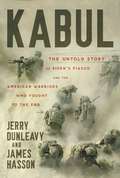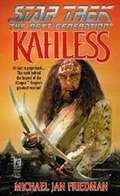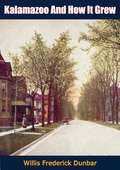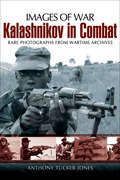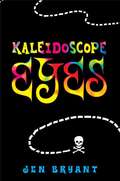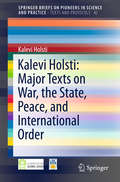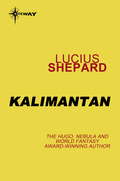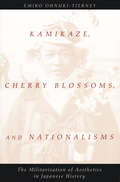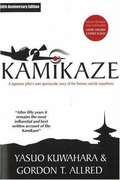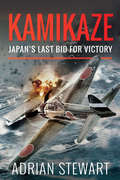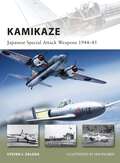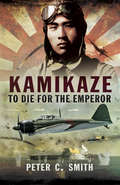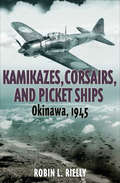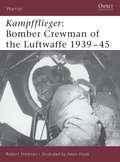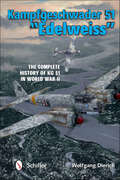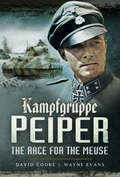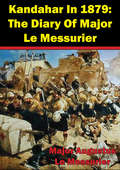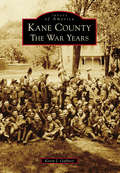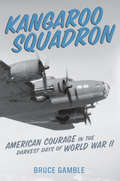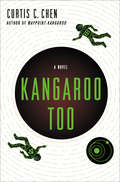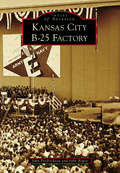- Table View
- List View
Kabul: The Untold Story of Biden's Fiasco and the American Warriors Who Fought to the End
by James Hasson Jerry DunleavyThis explosive national bestseller is the definitive account of the Biden administration's most disgraceful hour—and the chaos it unleashed in the world. America&’s chaotic retreat from Afghanistan in 2021 was nothing short of a horror show. Women and children were trampled to death outside the gates of the Kabul airfield. Desperate Afghans fell from the landing gear of departing planes. Taliban fighters mercilessly whipped and humiliated U.S. civilians trying to access the few square miles still controlled by American forces. Countless Afghan interpreters were abandoned to the mercy of the Taliban after risking their lives alongside American troops for years. And thirteen U.S. service members—eleven of whom were still in preschool on 9/11—were murdered in an ISIS suicide bombing that could easily have been prevented. Still, the full story is worse than anyone imagined. Drawing from hundreds of hours of first-person interviews, investigative reporter Jerry Dunleavy and former Army Captain and Afghanistan veteran James Hasson provide an exclusive, no-holds-barred account of the disastrous events of August 2021. Kabul is packed with shocking and infuriating exclusive details about fatal politics and bureaucracy that contributed to the catastrophe. The authors also tell, for the first time, inspiring stories of the bravery and sacrifices exhibited by countless Americans on the ground. Kabul's original reporting includes eyewitness accounts from servicemembers of all ranks who participated the rescue effort, inside information from senior intelligence officials, interviews with high-ranking members of allied governments, harrowing stories from Americans and Afghan allies willfully abandoned by craven officials in Washington, and exclusive details about veteran-led rescue missions that continue to this day. Chapter after chapter, Kabul depicts American government at its worst and &“ordinary&” Americans at their best. Ultimately, this book explains how Biden&’s Afghanistan retreat spurred a dangerous new era that persist for decades. While Americans watched the fall of Afghanistan with disbelief, our nation&’s enemies were also paying close attention.
Kahless (Star Trek: The Next Generation)
by Michael Jan FriedmanFor 1500 years, the Klingons have revered him as their first emperor, the legendary warrior who united their people and taught them the meaning of honor, but the truth of his incredible life has been shrouded in myth and fables... until now. A clone of the original Kahless now reigns as emperor, but the discovery of an ancient scroll throws the legends into doubt and threatens to tear the Klingon empire apart. Surrounded by treachery and rumors of revolt, this new Kahless can trust no one - except Captain Jean-Luc Picard and Lieutenant Worf of the U.S.S. Enterprise.
Kaiten
by Joy Waldron Michael MairIn November 1944, the U.S. Navy fleet lay at anchor in Ulithi Harbor, deep in the Pacific Ocean, when the oiler USS Mississinewa erupted in a ball of flames. Japan's secret weapon, the Kaiten--a manned suicide submarine--had succeeded in its first mission. The Kaiten was so secret that even Japanese naval commanders didn't know of its existence. And the Americans kept it secret as well. Embarrassed by the shocking surprise attack, the U.S. Navy refused to salvage or inspect the sunken Mighty Miss. Only decades later would the survivors understand what really happened at Ulithi, when a diving team located the wreck in 2001. In Kaiten, Michael Mair and Joy Waldron tell the full story from both sides, from the strategic importance of the USS Mississinewa to newly revealed secrets of the Kaiten development and training schools. U.S. Navy survivors recount their gripping experiences in the wake of the attack, as well as the harrowing recovery efforts that came later. Japanese pilots reveal their terrifying experiences training to die for their country and Emperor, never knowing when their moment of doom would come. INCLUDES PHOTOGRAPHS
Kalamazoo And How It Grew
by Willis Frederick DunbarMost of Kalamazoo County’s early white settlers were fur traders from England or New York. The remainder came from Pennsylvania and Maryland. After 1845 the number of foreign immigrants increased rapidly especially with the coming of the Hollanders in 1850. The growth rate of the county’s population reached its height between 1845-1860, when almost 8,000 newcomers settled there. That growth rate was not exceeded for 50 years when, between 1904-1920, the population grew to 214,000, quite an increase over the 1860 figure. Increased immigration, better transportation, and the appearance of diversified industries all played a role in Kalamazoo County’s growth.“Every community has its roots in the past. Its people live in the present and look to the future, but their way of life and their patterns of thought are conditioned by their heritage. A widespread understanding of that heritage is essential in order that progress may be planned wisely.“Hence, it has seemed desirable to gather into a single volume the story of Kalamazoo’s growth from a tiny fur-trading post in the wilderness to a modern metropolitan center.”—Willis F. Dunbar
Kalashnikov in Combat: Rare Photographs From Wartime Archives
by Anthony Tucker-JonesThe Kalashnikov assault rifle, generically known as the AK-47, is the most famous small arm ever made. This weapon has transcended its Soviet designer and country of origin to become the most prolifically produced and iconic weapon in the world and it has become a brand that has been used to sell everything from T-shirts to vodka.Although it first appeared in the late 1940s, it did not make its decisive presence felt on the battlefield until the Vietnam War when China supplied it to the Vietnamese communists. The weapons durability became a legend. Since then it has been employed in practically every conflict around the globe, and it is seen as the symbol of the wars of national liberation. Probably its most celebrated moment came in the hands of the mujahideen fighting to oust the Soviets from Afghanistan.In Kalashnikov in Combat Anthony Tucker-Jones gives the reader a brief history of the weapon and he offers a visual record of the impact of the AK-47 on the battlefield up to the present day. His account is illustrated with a wealth of archive photographs ranging from Vietnam to the American-led invasion of Iraq and beyond.
Kaleidoscope Eyes
by Jennifer BryantIn 1968, while the Vietnam War rages, thirteen-year-old Lyza inherits a project from her deceased grandfather, who was using his knowledge of maps and the geography of Lyza's New Jersey hometown to locate the lost treasure of Captain Kidd.
Kaleidoscope: An epic, unputdownable read from the worldwide bestseller
by Danielle SteelTHE WORLD'S FAVOURITE STORYTELLERNEARLY ONE BILLION COPIES SOLD Three sisters, bonded by blood, separated by fate . . . Can they ever find each other again?When Sam Walker returned from the front lines of World War II, bringing with him his exquisite French bride, no one could have imagined that their fairytale love would end in such a shattering tragedy. Nine-year-old Hilary, the eldest of the Walker children, clung desperately to her two sisters, five-year-old Alexandra and baby Megan.However, before the year was out, they too would be painfully wrenched from her tender arms. Cut off from every loving warmth, Hilary swore she would one day track down the man who had destroyed her family, and find her beloved sisters again. But could they risk everything to confront a dark, forgotten past?An epic and romantic tale from one of the best-loved writers of all time. Perfect for fans of Penny Vincenzi, Lucinda Riley and Maeve BinchyPRAISE FOR DANIELLE STEEL:'Emotional and gripping . . . I was left in no doubt as to the reasons behind Steel's multi-million sales around the world' DAILY MAIL'Danielle Steel is undeniably an expert' NEW YORK TIMES
Kalevi Holsti: Major Texts on War, the State, Peace, and International Order
by Kalevi HolstiIn honour of Prof. Kalevi Holsti's 80th birthday, this book includes key texts by the renowned Canadian International Relations scholar on war, the state, peace, and the international order. The first part includes texts on the Study of War, Use of Force in International Politics: Four Revolutions, and The Decline of Interstate War, while the second part analyses International Sports Competition and the Creation and Sustenance of Statehood, as well as Internationalism and Nationalism within the Multi-Community State. The third part addresses The Peacemakers: Issues and International Order, Governance Without Government: Polyarchy in 19th-Century European International Politics, and The Post-Cold War 'Settlement' in Comparative Perspective. Prof. Holsti is a former president of the International Studies Association and the author of a major textbook that was translated into Mandarin, Korean, Japanese, and Bahasa Indonesian. Thousands of undergraduates around the world are acquainted with his work.
Kalimantan
by Lucius ShepardCurtis MscKinnon is an intemperate, naïve fool. Sure of his invulnerability as an American expatriate, he comes to Borneo to play at being disreputable. His illusions and charm make him a dangerous man: soon enough, he is in trouble and forced to hide in the jungles of Kalimantan. He discovers a drug once used to the Punan Dayak, a lost race remembered as 'the dream wanderers'. Seribu aso does not, however, alter the perceptions of only the user. It changes the concrete reality of the land itself. MacKinnon has awoken the spirits of Kalimantan, the guardians of an unspoilt land. And he has no idea how powerful they are... With its echoes of Altered States and Heart of Darkness, Kalimantan has all the enthralling dark magic and superb story-telling that have made Lucius Shepard one of the most acclaimed fantasists today.
Kamikaze Diaries: Reflections of Japanese Student Soldiers
by Emiko Ohnuki-TierneyThis moving history presents diaries and correspondence left by members of the tokkotai and other Japanese student soldiers who perished during the war.
Kamikaze, Cherry Blossoms, and Nationalisms: The Militarization of Aesthetics in Japanese History
by Emiko Ohnuki-TierneyDrawing on diaries never before published in English, Ohnuki-Tierney describes these young men's agonies and even defiance against the imperial ideology. Passionately devoted to cosmopolitan intellectual traditions, the pilots saw the cherry blossom not in militaristic terms, but as a symbol of the painful beauty and unresolved ambiguities of their tragically brief lives. Using Japan as an example, the author breaks new ground in the understanding of symbolic communication, nationalism, and totalitarian ideologies and their execution.
Kamikaze: A Japanese Pilot's Own Spectacular Story Of The Famous Suicide Squadrons
by Yasuo Kuwahara Gordon T. AllredOriginally published in 1957, this enduring classic--the first-ever English publication cowritten by a Japanese suicide pilot--remains a touching and insightful look into the world of the kamikaze. This edition, now completely revised, reflects the valuable insight and perspective gained by the author since the time of the book's initial publication. From the age of 15, Yasuo Kuwahara began a life of military service that included suffering through brutal basic training, participating in ferocious aerial combat against the Allies, and avoiding a suicide mission when an atomic bomb was dropped in Hiroshima, near his hometown. From being handpicked for kamikaze service to finding the discipline to die for the emperor, this history presents a firsthand account of the fascinating life of a kamikaze fighter pilot.
Kamikaze: Japan's Last Bid for Victory
by Adrian StewartThis enlightening WWII history examines Japans Kamikaze Corps of special forces pilots who engaged in terrifying suicide attacks.By late 1944, the Japanese had already proved themselves fanatical in their quest for victory. But the actions of the Kamikaze Corps took matters to a new level. Western military forces were dumbfounded by an enemy strategy of deliberate self-sacrifice.Beginning with the Leyte Gulf battle, Kamikaze attacks continued during the invasion of the Philippines in early 1945 and reached a climax during the months-long Battle of Okinawa. In total, more than a thousand kamikaze airmen perished.In Kamikaze, historian Adrian Stewart examines the historic and cultural roots of the unique and unsettling phenomenon. He also provides graphic descriptions of these suicide attacks and their devastating impact on Allied forces.
Kamikaze: Japan's Last Bid for Victory
by Adrian StewartThis enlightening WWII history examines Japans Kamikaze Corps of special forces pilots who engaged in terrifying suicide attacks.By late 1944, the Japanese had already proved themselves fanatical in their quest for victory. But the actions of the Kamikaze Corps took matters to a new level. Western military forces were dumbfounded by an enemy strategy of deliberate self-sacrifice.Beginning with the Leyte Gulf battle, Kamikaze attacks continued during the invasion of the Philippines in early 1945 and reached a climax during the months-long Battle of Okinawa. In total, more than a thousand kamikaze airmen perished.In Kamikaze, historian Adrian Stewart examines the historic and cultural roots of the unique and unsettling phenomenon. He also provides graphic descriptions of these suicide attacks and their devastating impact on Allied forces.
Kamikaze: Japanese Special Attack Weapons 1944-45
by Steven Zaloga Ian PalmerThe destruction of much of the remainder of the Japanese fleet and its air arm in the later half of 1944 left the Japanese Home Islands vulnerable to attack by US naval and air forces. In desperation, the Imperial Japanese Navy proposed using "special attack" formations, a euphemism for suicide attacks. These initially consisted of crude improvisations of conventional aircraft fitted with high-explosive bombs that could be crashed into US warships. Called "Divine Wind" (Kamikaze), the special attack formations first saw action in 1944, and became the scourge of the US fleet in the battles for Iwo Jima and Okinawa in 1945. In view of the success of these attacks, the Japanese armed forces began to develop an entire range of new special attack weapons. This book begins by examining the initial kamikaze aircraft attacks, but the focus of the book is on the dedicated special attack weapons developed in 1944, including the Ohka, a rocket-powered guided missile and the Kaiten man-guided torpedo submarines. It also covers specialized suicide attack weapons such as anti-tank lunge mines. Much of the information in this book comes from little known US intelligence reports and photos compiled after the war that have never been widely published.From the Trade Paperback edition.
Kamikaze: To Die for the Emperor
by Peter C. SmithIn this brand new publication from eminent historian Peter C. Smith, we are regaled with the engaging and often incredibly disturbing history of the Kamikaze tradition in Japanese culture. Tracing its history right back to the original Divine Wind (major natural typhoons) that saved Japan from invaders in ancient history, Smith explores the subsequent resurrection of the cult of the warrior in the late nineteenth century. He then follows this tradition through into the Second World War, describing the many Kamikaze suicide attacks carried out by the Emperor's pilots against Allied naval vessels in the closing stages of the Pacific campaign.These pilots were at the mercy of an overriding cultural tradition that demanded death over defeat, capture or perceived shame. Despite often being under-trained and ill-prepared psychologically for the sacrifices they were about to make, they were nonetheless expected to make them. The dedication of sacrifice for the Emperor and the Nation is explored by dissecting the traces left behind by these pilots. Smith provides a detailed look at the heartbreak of the pilot's families and the men themselves, the notes they left and the effects on those who did not share their philosophy. The views of individuals under attack are also included in this balanced history.Countless attacks carried out over the Philippine Islands (including the sinking of the St Lo) are analyzed and the Okinawa campaign is afforded particularly strong coverage, with the sinking of HMAS Australia explored in detail. The collective sacrifice is then summed up, with reflections from survivors on both sides appraising events in a humane historical context. A detailed appendices then follows, featuring units formed, sorties mounted, ships sunk and damages inflicted.
Kamikazes, Corsairs, and Picket Ships: Okinawa 1945
by Robin L. RiellyThe untold story of ferocious air and naval combat during the WWII Battle of Okinawa—drawn from primary sources and survivor interviews. This is the story of an overlooked yet significant aerial and naval battle during the American assault on Okinawa in the spring of 1945. While losses to America&’s main fleet are well recorded, less well known is the terrific battle waged on the radar picket line, the fleet&’s outer defense against Japanese marauders. Weaving together the experiences of the ships and their crews—drawn from ship and aircraft action reports, ship logs, and personal interviews—historian Robin L. Reilly recounts one of the most ferocious air and naval battles in history. The US fleet—and its accompanying airpower—was so massive that the Japanese could only rely on suicide attacks to inflict critical damage. Of the 206 ships that served on radar picket duty, twenty-nine percent were sunk or damaged by Japanese air attacks, making theirs the most hazardous naval surface duty in World War II. The great losses were largely due to relentless kamikaze attacks, but also resulted from the improper use of support gunboats, failure to establish land-based radar at the earliest possible time, the assignment of ships ill-equipped for picket duty, and, as time went on, crew fatigue. US air cover during the battle is also described in full, as squadrons dashed from their carriers and land bases to intercept the Japanese swarms, resulting in constant melees over the fleet.
Kampfflieger: Bomber Crewman of the Luftwaffe 1939-45
by Adam Hook Robert StedmanThe Kampfflieger are relatively unknown within aviation circles, although many of them had careers as distinguished as those of their fighter-pilot counterparts. The men of the bomber crews did not enjoy the luxury of combat tours - they flew until they died or became unfit for combat duty. This book studies the attitudes, beliefs and motivation of the average crewman, following him through recruitment and training to experience on campaign in western Europe, Africa and the Russian front during World War II (1939-1945), detailing the exploits and trials of the famous Ju 87 'Stuka' dive-bomber crews and their own crucial part in Germany's war effort.
Kampfgeschwader 51 "EdelweiSS": The Complete History of KG 51 in World War II
by Wolfgang DierichRare unit history of a World War II Luftwaffe bomber unit
Kampfgruppe Peiper: The Race for the Meuse
by David Cooke Wayne Evans&“A fast paced story . . . If this is the only book you can buy of the Battle of the Bulge, this is the one to go for. Highly commended.&”—Firetrench On 16 December 1944 Hitler&’s last great offensive commenced, pushing through the difficult terrain of the Ardennes in Belgium. Its objectives were the Meuse bridges and, beyond them, Antwerp. Hitler&’s aim was to cut off the northern British and American armies and force them to surrender or retreat. At the forefront of the German assault was Kampfgruppe Peiper of the SS Leibstandarte Adolf Hitler Division. It was the most powerful force in the German order of battle. Travelling along roads hardly suitable for cars, let alone Tiger tanks, the kampfgruppe had to cross numerous streams and rivers to reach its objectives. It was delayed by a handful of American combat engineers who blew up bridges, then it was brought to a halt by American reinforcements. As the tide turned, the kampfgruppe fought for its life, holding out for several days in a desperate rearguard action against increasing odds. David Cooke and Wayne Evans use contemporary accounts and a wealth of maps and illustrations to tell the story of Kampfgruppe Peiper in unprecedented detail. &“This well written volume makes fascinating reading. The superb text is accompanied by a full walking and driving battlefield tour, making this publication an invaluable addition to any military enthusiast&’s library.&”—Roll of Honour
Kandahar In 1879: The Diary Of Major Le Messurier
by Major Augustus Le MessurierA remarkable diary from the wars of the British Empire of the historic march on Kandahar in 1879.The Second Anglo-Afghan war 1878-1880 was intended to establish peace and British hegemony to the North-West frontiers of the Indian Empire. After the brutal and disastrous effort of the British to invade during the first war (1842) the Afghans would not be underestimated and remained dangerous on their own territory. The British, quick to realize that another reverse in this country would signal an end to their prestige and influence, organize a relief effort. Formed into three columns, the troops were well prepared and commanded by veteran generals, each setting out to pacify a different area of the country.Major Augustus Le Messurier was appointed brigade major of the Royal Artillery attached to the Kandahar Field Force, one of the invading columns under the command of Lt.-Gen. D. M. Stewart. The terrain that the Kandahar field force had to cover was among the toughest in the world, and constantly harassed by irregulars, hunger, cold they made Kandahar by dint of superhuman efforts.
Kane County: The War Years (Images of America)
by Kevin J. GaffneyThe declaration of war in 1917 and the attack on Pearl Harbor by the Japanese on December 7, 1941, stirred the men and women of Kane County, Illinois, to action and service. In World War I, many in Kane County joined the Illinois National Guard 3rd Regiment, 65th and 66th Brigades, and 129th and 131st Infantries of the 33rd Infantry Division. Many of the men also served in the infantry regiments of the 1st Division, known also as the “Big Red One.” They trained for war in places like Camp Deneen in Elgin, Camp Grant in Rockford, and Camp Logan in Houston, Texas. In World War II, Kane County’s men performed on the war’s biggest stages, aiding in Operation Torch, Operation Husky, and the invasion of Normandy. The women of Kane County also served overseas in both world wars as Red Cross nurses and WAVES, and domestically, they worked in factories, supporting in many vital ways.
Kangaroo Squadron: American Courage in the Darkest Days of World War II
by Bruce GambleIn early 1942, while the American military was still in disarray from the devastating attacks on Pearl Harbor and the Philippines, a single U.S. Army squadron advanced to the far side of the world to face America's new enemy.Based in Australia with inadequate supplies and no ground support, the squadron's pilots and combat crew endured tropical diseases while confronting numerically superior Japanese forces. Yet the outfit, dubbed the Kangaroo Squadron, proved remarkably resilient and successful, conducting long-range bombing raids, carrying out armed reconnaissance missions, and rescuing General MacArthur and his staff from the Philippines.Before now, the story of their courage and determination in the face of overwhelming odds has largely been untold. Using eyewitness accounts from diaries, letters, interviews, and memoirs, as well as Japanese sources, historian Bruce Gamble brings to vivid life this dramatic true account.But the Kangaroo Squadron's story doesn't end in World War II. One of the squadron's B-17 bombers, which crash-landed on its first mission, was recovered from New Guinea after almost seventy years in a jungle swamp. The intertwined stories of the Kangaroo Squadron and the "Swamp Ghost" are filled with thrilling accounts of aerial combat, an epic survival story, and the powerful mystique of an invaluable war relic.
Kangaroo Too: A Novel
by Curtis C. ChenSet in the same world as Waypoint Kangaroo, Curtis C. Chen's Kangaroo Too is bursting with adrenaline and intrigue in this unique outer space adventure.On the way home from his latest mission, secret agent Kangaroo’s spacecraft is wrecked by a rogue mining robot. The agency tracks the bot back to the Moon, where a retired asteroid miner—code named “Clementine” —might have information about who’s behind the sabotage. Clementine will only deal with Jessica Chu, Kangaroo’s personal physician and a former military doctor once deployed in the asteroid belt. Kangaroo accompanies Jessica as a courier, smuggling Clementine’s payment of solid gold in the pocket universe that only he can use. What should be a simple infiltration is hindered by the nearly one million tourists celebrating the anniversary of the first Moon landing. And before Kangaroo and Jessica can make contact, Lunar authorities arrest Jessica for the murder of a local worker. Jessica won’t explain why she met the victim in secret or erased security footage that could exonerate her. To make things worse, a sudden terror attack puts the whole Moon under lockdown. Now Kangaroo alone has to get Clementine to talk, clear Jessica’s name, and stop a crooked scheme which threatens to ruin approximately one million vacations. But old secrets are buried on the Moon, and digging up the past will make Kangaroo’s future very complicated...
Kansas City B-25 Factory (Images of Aviation)
by John Fredrickson John RoperAn industrial miracle took place at the Fairfax Airport, on the shores of the Missouri River, between 1941 and 1945. A massive factory was quickly built and a large modification center was soon added. At its peak, over 24,000 greater Kansas City-area residents were employed by North American Aviation, Inc. Their goal was to build as many twin-engine B-25 Mitchell medium bombers for wartime service as possible. Their success was the construction of an unprecedented 6,608 aircraft. The B-25 Mitchell served with distinction in every theater of World War II, and significant numbers of them were provided to Allied nations. Many B-25s have been preserved, and some of them remain airworthy today. They can be seen on static display or in flight at air shows all across America.
